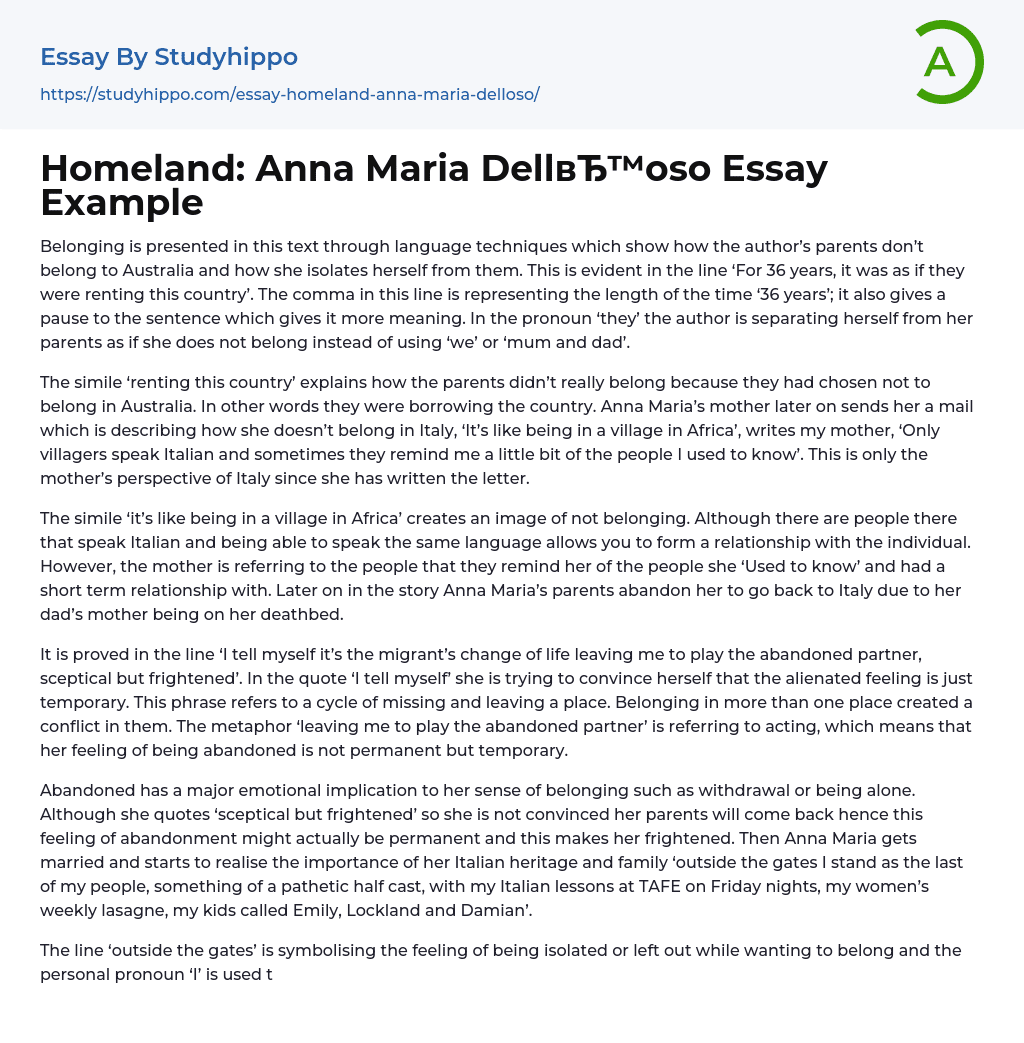The metaphor 'renting this country' illustrates how the parents did not identify themselves as truly belonging since they elected not to consider Australia as their homeland. It implies they were merely temporary residents in the country. Anna Maria later receives
...a letter from her mother, describing her feelings of not fitting in Italy, with words 'It feels like being in an African village', as penned by her mother, 'Only locals converse in Italian and occasionally they remind me of the people I was once acquainted with.' This belief is unique to the mother, as it is presented through her penned letter.
The comparison 'it’s like being in a village in Africa' evokes a sense of alienation. Despite the presence of Italian speakers, which theoretically enable connections through shared language, the sense of unfamiliarity still lingers. The mother's comparison appears to be rooted in her past encounters with people that she 'used to know', with whom she had fleeting connections. This feeling of out-of-placeness is later heightened when Anna Maria's parents retreat back to Italy, prompted by the imminent death of
her paternal grandmother.
The assertion 'I tell myself it’s the migrant’s change of life leaving me to play the abandoned partner, sceptical but frightened' illustrates this evidence. The phrase ‘I tell myself’ indicates her attempt to reassure herself that her sense of alienation is ephemeral. This utterance signifies the continual cycle of departing from and longing for a place. Existence in multiple places instigates an internal conflict within them. The metaphor 'leaving me to play the abandoned partner,' points towards the notion of acting out a role, suggesting that her feeling of abandonment is not everlasting but transient.
Being abandoned significantly impacts her existential belonging, resulting in feelings of isolation and displacement. She expresses a blend of scepticism and fear, hinting at her deep-seated apprehension that her parents may never return, subsequently solidifying her sense of permanent abandonment. With time, marriage takes Anna Maria down a path of self-realization and she begins to understand the value of her Italian lineage and relatives. She states 'at the gates, I represent the last of my kind, somewhat of a pitiful mixed-race, taking Italian classes at TAFE every Friday night, preparing lasagne from the women's weekly, and having children named Emily, Lockland and Damian'.
The phrase 'outside the gates' serves as a metaphor for feeling alienated or excluded, coupled with a desire for acceptance and belonging. The writer's use of the first-person pronoun 'I' depicts her sense of culpability for not identifying with her Italian lineage. She seems to consider herself as the last beacon of hope in her family, 'I stand as the last of my people,' likely due to being the youngest in her large Italian family. The term
half-cast, commonly used in Australia to denote individuals from the 'stolen generation' (half Aboriginal, half British), is employed here symbolically to depict her status of being part Italian and part Australian. The phrase 'With my Italian lessons at TAFE on Friday nights' represents her attempts at learning the language of her cultural heritage while surrounded by Australians.
The text also includes the names of her children, 'Emily, Lockland, and Damian,' which are distinctly non-Italian. Towards the end of the narrative, she receives a disconcerting message from her mother. The note highlights that she doesn't fit completely into Italy anymore, given the dramatic transformations such as a precarious social setting, polluted water, prevalent work strikes, a youth generation uninterested in labor, and incompetent doctors. This showcases the usage of an accruing list technique to underline the enormity of what has dramatically changed or vanished compared to their previous departure.
The text suggests an overwhelming transformation in Italy represented by the word 'all', implying that everything they once knew is now gone due to these changes. The term 'lost' symbolizes the absence of once familiar elements, emphasizing its drastic contrast from her previous departure. The narrative further suggests that people's attachment and identity associated with a place evolve over time, leading to a shift in their sense of belonging. This is depicted through the parents' perspective who no longer identify with the Italy they left 36 years ago. Perceptions of belonging or alienation are individualistic and vary as people experience them differently, reflecting that a sense of belonging or alienation is entirely subjective.
The text provided does not contain any content to beor unified. The "
" and "
" are
paragraph tags and usually enclose text or other content. However, this case does not include any such content.
- Second Language essays
- English Language essays
- Semiotics essays
- Dialect essays
- Sign Language essays
- Spanish Language essays
- French Language essays
- Language Education essays
- Second Language Acquisition essays
- Teaching English As A Foreign Language essays
- Verb essays
- Gesture essays
- Ambition essays
- Anger essays
- Betrayal essays
- Boredom essays
- Confidence essays
- Courage essays
- Desire essays
- Disgrace essays
- Doubt essays
- Empathy essays
- Fairness essays
- Fear essays
- Feeling essays
- Forgiveness essays
- Grief essays
- Guilt essays
- Happiness essays
- Harmony essays
- Hate essays
- Honesty essays
- Honor essays
- Hope essays
- Humanity essays
- Inspiration essays
- Kindness essays
- Laughter essays
- Loneliness essays
- Lost essays
- Loyalty essays
- Need essays
- Passion essays
- Pressure essays
- Pride essays
- Regret essays
- Respect essays
- Responsibility essays
- Sarcasm essays
- Shame essays




